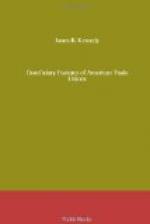[Footnote 170: Typographical Journal, Vol. 7, No. 5, p. 3.]
[Footnote 171: Proceedings of the Forty-second Annual Session, 1894, p. 3.]
[Footnote 172: Proceedings of the Forty-third Annual Session, 1896, pp. 76, 86.]
In 1894 at the eighth general session and again at the ninth in 1896 the Carpenters and Joiners considered seriously the question.[173] The Boot and Shoe Workers at their fifth convention in 1902, although refusing to adopt a proposed plan for a national system, recommended as a partial substitute that all local unions raise funds for the payment of dues of out-of-work members and provide such other relief as they should deem wise, “to the end that from the experience so gained a national plan for relief of unemployed members may be developed."[174]
[Footnote 173: The Carpenter, Vol. 14, September, 1894; Vol. 16, September, 1896.]
[Footnote 174: Proceedings of the Fifth Convention, 1902, p. 28.]
In the unions maintaining out-of-work benefits it is customary to provide as a precautionary measure that members must have been in good standing for a lengthy period before being entitled to the benefit. The Cigar Makers and the Deutsch-Amerikanischen Typographia provide that only members of the union in good standing for two years shall be entitled to the benefit.[175]
[Footnote 175: Constitution of the Cigar Makers’ International Union of America, 1896, thirteenth edition (Chicago, n.d.), sec. 117; Constitution of the Deutsch-Amerikanischen Typographia, 1901.]
Both the Cigar Makers and the Typographia have also stringent regulations intended to prevent fraud. In the Cigar Makers’ Union a member thrown out of employment must obtain from the collector of the shop in which he works a certificate stating the cause of his discharge. If the unemployment is caused by the intoxication of the member, or if he has “courted his discharge” through bad workmanship or otherwise, he is not entitled to the benefit for eight weeks. Mere inability to retain employment does not, however, deprive a member of the relief. If a member leaves employment of his own volition, he is not entitled to a benefit until he has obtained work again for at least one week. Having obtained the certificate of the collector, the unemployed member must register at the office of the union in a book provided for that purpose. After having been registered for one week, he begins to draw the out-of-work benefit. If while receiving out-of-work pay he refuses to work in a shop where work is offered him, or neglects to apply for work when directed by an officer of the union, he loses his right to the benefit and cannot receive out-of-work pay again until he has had employment for at least one week. Shop collectors are required to report immediately the name of any member refusing to work.




